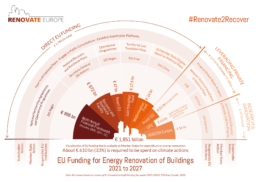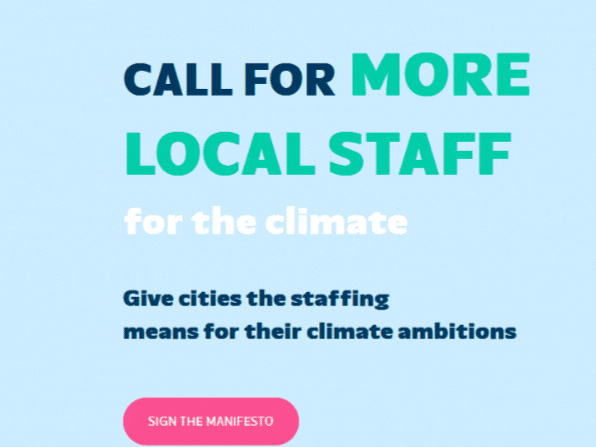Spend wisely: How to use Cohesion Funding for Energy Renovation

The European Regional Development Fund (ERDF), Cohesion Funds (CF) and the European Social Fund Plus (ESF+) can make a big difference for buildings renovation. But the Operational Programmes must be designed and implemented in a way that creates and sustains a renovation market for the longer term, beyond the “cliff-edge” end of the programming period.
We strongly urge Member States to consider the Key Recommendations on how to channel MFF funding effectively towards energy renovation in the Operational Programmes, namely by:
- Ensuring coherence with EU long-term climate objectives
- Avoid programmes funding single measures
- Scale the aid according to quality and ambition of the renovation project
- Attracting and leveraging private financing
- Limit the use of grants
- Favour lower support intensity
- Modulate the level of the aid rate to increase the leverage of private funding
- Encourage blended finance, combining Financial Instruments with grants
- Establish continuous calls
- Complementing and/or boosting national regulatory and funding initiatives already underway
- Maximise coherence with the national ambitions on buildings
- Facilitate MFF coordination with national funding schemes
- Ensure better coherence/integration of programs for energy renovation with those on renewable energy in buildings
- Streamline the administrative process at national level
- Maximising Programme Implementation
- Ensure sufficient allocation for Technical Assistance
- Ensure MFF-supported training programmes
- Complement the funding with an information campaign
- Better tracking and data collection
- Encourage digitalization
The buildings sector is a sector of enormous economic potential, creating local jobs and reducing citizens energy bills – all the while reducing greenhouse gas emissions and slashing Europe’s dependence on foreign imports.
Read our recommendations more in detail here.

Letter to EU Energy Ministers on Article 6 of the EED

Dear Minister,
At Monday’s Energy Council, your input will be decisive in reaching a General Approach on the Energy Efficiency Directive. In my capacity as Director of the Renovate Europe Campaign, I urge you to consider the importance of a robust Article 6 on public buildings.
Citizens look to their governments for leadership and action. Renovation is a concrete measure that will deliver long-lasting, sustainable solutions to the energy, social and climate emergency we face.
Reducing the energy demand, and therefore the energy bills, of our public buildings is a crucial step in translating political discourse on slashing energy imports into immediate action.
Against an increasingly worrying backdrop of skyrocketing energy bills, it is no longer acceptable that Europe’s leaky buildings account for the largest share of final energy consumption at a high of 40%.
Public buildings must lead the way, as a means of preparing the market and raising awareness, but also in demonstrating a tangible contribution and commitment to real change.
We therefore call on you to ensure that the public sector leads by example with
- An agreement that 3% of public buildings owned by public bodies must be deeply renovated to become nearly zero energy buildings as soon as possible.
- Setting minimum performance standards for all segments of public bodies, including social housing and historic buildings. This will be important in ensuring a just transition, taking into consideration some of the most vulnerable people in society, and will also take account of the technological advances developed to cater for the specificities of historic buildings. Historic buildings can represent up to 30% of the building stock in some countries and already feature as important element in several Long-term Renovation Strategies and National Recovery Plans.
Reducing the energy waste in Europe’s buildings is at the forefront of citizen concerns. Governments must set the tone and lead the way by taking action on public bodies in the Energy Efficiency Directive.
The urgent need for action could not be more clear.
Yours sincerely,
Adrian Joyce
Campaign Director
Op-ed: Spend wisely: Use cohesion funding for energy renovation (Euractiv)
Published by Euractiv on: 20 June 2022 | The EU budget can go a long way toward helping member states achieve higher ambition on energy-efficiency renovation of buildings. But the money must be spent wisely, writes Adrian Joyce.
Renovate Europe supports the campaign for "More local staff to achieve the climate transition"

The Renovate Europe Campaign is happy to announce our endorsement of the Energy Cities campaign for “More local staff to achieve the climate transition”.
The signatories of the manifesto urge the national governments of EU Member States and the European Commission to:
- Finance the recruitment of municipal & local public bodies staff
- Make jobs more appealing & support local pooling of expertise
- Provide training & reallocation programmes to upskill municipal & related local public bodies staff
- Provide a framework enabling local governments to develop their own green budget, investments, & workforce
Discover more about it here.
Sign the manifesto here.
Skills through the multi-annual financial framework: building renovation in the Mediterranean area
A trained workforce and skilled public administration will be essential to support the drive to a highly energy efficient building stock, in line with EU climate neutrality goals. This 90-minute online conversation, that we co-organised with Energy Cities (representing the Interreg MED Efficient Buildings Community) and EFBWW, informs EU, national and regional stakeholders on how to maximise current opportunities to increase the availability of a qualified workforce for energy renovations, particularly for public buildings.
It looks at the importance of skills and training as a pre-requisite for rolling out successful renovation schemes on the ground. We explore how to make the most of the Multi-Annual Financial Framework 2021-2027 for upskilling workers as well as local stakeholders and administration with the aim of boosting the rate and depth of energy renovation, particularly in the Mediterranean area (Croatia, France, Greece, Italy, Slovenia and Spain).
Agenda
Welcome – Miriam Eisermann, Energy Cities
Panel 1: EU-level perspectives and opportunities on skills and training for energy renovation
- Introduction: Why workforce upskilling is so important to deliver renovation schemes – Adrian Joyce, Renovate Europe Campaign
- Opportunities to boost skills in energy renovation through the Multi-Annual Financial Framework and Just Transition Fund (JTF) – Maeva Roulette, DG EMPL
- Needs, challenges and opportunities for upskilling the construction workforce on energy renovation – Rolf Gehring, EFBWW
- Insights from CINEA – Luca Angelino, CINEA
- Q&A moderated by Adrian Joyce, Renovate Europe Campaign
Panel II: Upskilling of local stakeholders and administration for better buildings
- Introduction – Miriam Eisermann, Energy Cities
- Strengthening planning and management skills of public building owners
- Belinda Gottardi, Mayor of Castello Maggiore (Italy)
- Evangelos Evangelides, Mayor of Aradippou (Cyprus)
- Helder Gonçalves, Director of Portuguese National Energy Laboratory LNGE and national coordinator of BUILD UP Skills FORESEE
- Q&A moderated by Peter Schilken, Energy Cities
Wrap-up – Adrian Joyce, Renovate Europe Campaign
End
How to unlock the Renovation Wave?
The Renovate Europe Campaign and Positive Money Europe co-organised the webinar “How to unlock the Renovation Wave” on the occasion of the launch of the Unlock campaign. The event took place online on Wednesday, May 11th from 11am to 12.15am CEST.
The current recast of the Energy Performance of Buildings directive (EPBD) proposes comprehensive measures to accelerate energy efficient renovation of residential buildings. However, financing the Renovation Wave remains a complex challenge. The Commission expects a funding gap of around € 275 billion per year by 2030. Public funding for renovation purposes is often too slow to deploy, too bureaucratic, and not scalable enough due to the magnitude of the challenge.
ECB research estimates that around € 214 billion/year of the needed additional funding should be covered by bank loans. The text reviewed by the Commission rightly emphasised the role of energy efficiency loans and mortgages in the Renovation Wave by introducing the concept of Mortgage Portfolio Standard. However, banks lack incentives to offer cheap lending products.
What role can the banking sector play in the Renovation Wave? How can the European Central Bank unlock affordable green loans and green mortgages? Our experts answered these questions during the online webinar.
– Adrian Joyce (Renovate Europe) will present on the current state of play of the renovation challenge;
– Peter Sweatman (Climate Strategy) will introduce the EU renovation loan;
– Uuriintuya Batsaikhan (Positive Money Europe) will show how the ECB can finance home renovations through its refinancing operations and TLTROs programme.
A discussion with Member of the EU Parliament Sean Kelly, EU Commission’s Karlis Goldstein, and Jennifer Johnson from the European Mortgage Federation followed with a dedicated space for questions.
The event closed with Vicky Van Eyck (Positive Money Europe) introducing the Unlock campaign.





